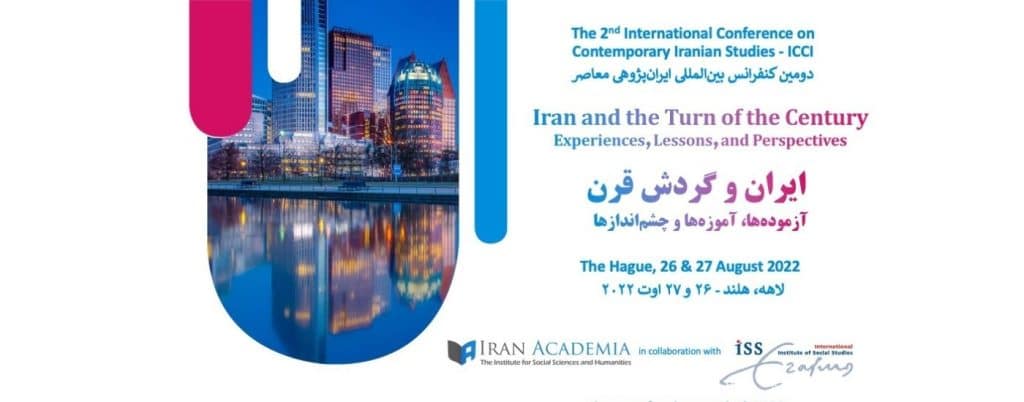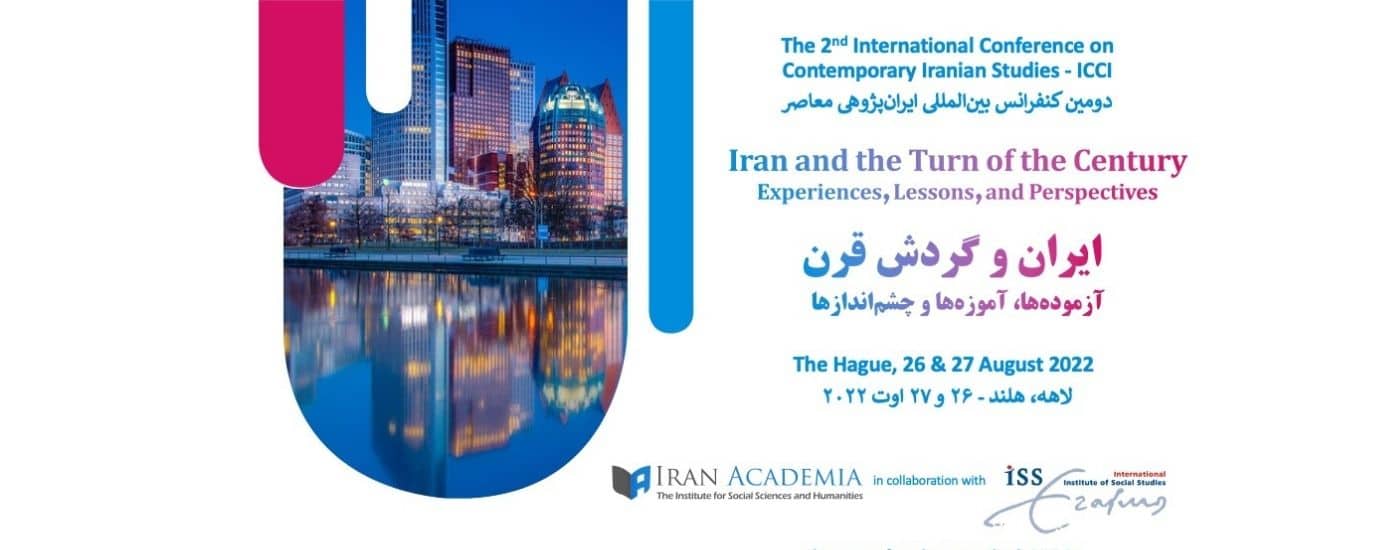
Coinciding with the tenth anniversary of the educational activities of Iran Academia;
Iran Academia organizes in collaboration with the International Institute of Social Studies.
The second International Conference on Contemporary Iranian Studies on the Subject
Iran and the Turn of the Century; Experiences, Lessons, and perspectives
Iran has had numerous ups and downs and fundamental transformations in the last century, and it faces many obstacles and super-challenges at the start of the fifteenth century. Two very different political systems, the condition of economic, cultural, and political development, the experience of multiple direct and indirect conflicts, the closure of the political space, and the almost half-century rule of Islamists have all been among Iran’s experiences in the previous century. The theme of these experiences, lessons, and perspectives on Iran in the Twenty-First Century, will be explored at the International Conference on Contemporary Iranian Studies.
The following are some of the subjects and themes that can be discussed during this international bilingual conference:
- سیر علوم انسانی و اجتماعی در ایران: از پیدایی شاخههای علوم انسانی و اجتماعی و شکلگیری اولین مراکز پژوهشی دانشگاهی تا انقلاب فرهنگی (۱۳۵۹-۱۳۶۲)، مشکلات، محدودیتها، پیامدهای اسلامی کردن علوم انسانی، تاثیر آن بر پژوهش و آموزش علوم انسانی اجتماعی در درون و بیرون دانشگاهها، پژوهشهای مربوط به ایران معاصر در فضاهای آکادمیک خارج از ایران.
- دانشگاه و آموزش عالی، یا بهطور کلی آموزش: پرسشها پیرامون پیامدهای اسلامی کردن آموزش و استفاده ابزاری و ایدئولوژیک از آن برای کنترل اجتماعی و یا گذار از یک آموزش عالی محدود و نخبهگرا به آموزش عالی تودهای.
- آزادی اندیشه و بیان: یک قرن چالش بر سر آزادی اندیشه و بیان؛ و آسیبهای اساسی ناشی از آن برای رشد جامعه ایران.
- مسئله قانون: چرا و چگونه رؤیاهای قانونیت و حکومت قانون نتوانستند به واقعیت تبدیل شوند و جامعه ما هنوز درگیر موضوع قانون است؟
- دولت و جامعه: تحولات رابطه جامعه ایران با دو الگوی دولتی توسعه آمرانه و حکومت دینی و یا دوره کموبیش خاص ۱۳۲۰ تا ۱۳۳۲.
- زنان و جنسیت: تحولات اصلی در زمینه هنجارها، گفتمانها، و مناسبات مربوط به جنس، جنسیت، و جنسانیت (سکسوالیته)، وضعیت و جایگاه زنان در جامعه ایران، نابرابریها و تبعیضهای جنسی و جنسیتی ، و نیز جنبشهای اجتماعی زنان.
- دین: تحولات جایگاه دین در جامعه در چهارچوب یک نظام کموبیش سکولار تا سال ۱۳۵۷ و سپس در نظام دینسالار و حکومتی که در آن روحانیون شیعه نقش اصلی را بازی میکنند. نوع حضور دین در عرصههای سیاسی و اجتماعی، نقش دین در سیاست و اجتماع، سرنوشت سکولاریسم در سایه نظام دینی حاکم بر ایران.
- حقوق بشر: موضوع حقوق بشر و جایگاه آن در جامعهای که حکومتهای بیباور به حقوق بشر دست بالا را در سیاست و دولت داشتهاند.
- محیط زیست: مسئله آب و جوانب اجتماعی و اقتصادی آن چگونه به بحران فراگیر و دغدغههای اساسی دهههای پایانی قرن تبدیل شدند و ایران در برابر کدام دورنمای زیستمحیطی قرار دارد؟
- مهاجرت درونی و بیرونی: تحول جایگاه و سمتوسوی مهاجرت در دورههای گوناگون قرن چهاردهم و رابطه آن از جمله با مسائلی مانند توسعه یا نیروی انسانی.
- روشنفکران: نقش روشنفکران و گرایشهای روشنفکری در تحولات و جنبشهای فکری و اجتماعی ایران و در سرفصلهای اصلی قرن چهاردهم.
- نابرابریهای اجتماعی: تغییرات در قشربندی جامعه ایران و موضوع تحول نابرابریهای گوناگون اجتماعی.
- سیاست خارجی: تحولات رابطه ایران با دنیا و بهویژه کشورهای منطقه، پارادایمهای اصلی حاکم بر سیاست خارجی منطقهای و جهانی ایران و دورنماهای ژئوپولیتیک منطقه و نقش ایران.
- اقلیتهای قومی و دینی: نابرابریها و تبعیضهای دینی و مذهبی، قومی، فرهنگی و زبانی در ایران.
- دموگرافی (خانواده ، زاد ولد، خطر جمعیت)
Please note that the themes are not restricted to those listed above, and you are welcome to submit an abstract for any other study that you believe is related to the conference theme.
دانشگاه علوم اجتماعی و انسانی ایران آکادمیا، از همه پژوهشگران و اندیشمندان دعوت میکند تا در این بحث گشوده و جمعی، همراهی و مشارکت کنند.
ارائه سخنرانی و انتشار در ژورنال رسمی کنفرانس
برای شرکت به عنوان سخنران، لازمست یک چکیده با حداقل ۵۰۰ کلمه در شرح پژوهش خود ثبت کنید. شما میتوانید تا تاریخ آغاز کنفرانس، نسخه کامل مقاله خود را، به کنفرانس بفرستید. مقالات پذیرفته شده، ضمن دریافت DOI، در ژورنال دوزبانه کنفرانس بینالمللی ایرانپژوهی معاصر، به انتشار خواهند رسید.
Timeline:
Deadline for submitting a speech abstract to participate in the panel: until June 15
Announcement of the results of the review of the participating abstracts: up to the 20th of June
Conference time:
Friday 26 August (English Conference)
Saturday, August 27 (Persian Conference)
Conference location:
International Institute of Social Studies (ISS), The Hague, The Netherlands
International Institute of Social Studies (ISS)
Kortenaerkade 12, 2518 AX The Hague, The Netherlands
Conference fee:
Attendance at this conference is free.
Conditions for attending the conference:
To attend this conference, you must first fill out the registration form. (Please see the text below.)
Executive framework:
This conference is held on campus.
In the following exceptional cases, speakers can participate in the panel online and present their discussion
1- Retired academics and researchers who are unable to earn travel reimbursement from their institution or research center due to medical constraints.
2- The speaker was not





